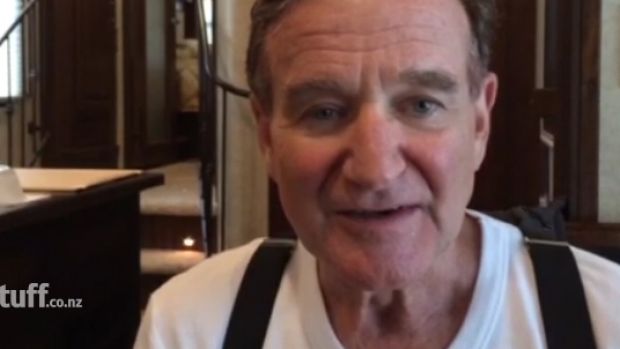Robin Williams was "drowning in his symptoms" before he took his own life without knowing what was wrong with him, his widow has revealed.
Susan Schneider said her late husband's "larger than life spirit" was crushed by "skyrocketing" fear and anxiety, a "continuous" tremor in his left hand, a "shuffling gait", "terrible insomnia" and a "loss of basic reasoning" and memory.
More Entertainment Videos
Depression didn't kill Robin Williams: widow
Susan Williams tells ABC television's Good Morning America about the circumstances surrounding her husband's death.
While filming Night At The Museum 3, "Robin was having trouble remembering even one line for his scenes, while just three years prior he had played in a full five-month season of the Broadway production Bengal Tiger At The Baghdad Zoo, often doing two shows a day with hundreds of lines - and not one mistake", she writes in a personal essay titled The Terrorist Inside My Husband's Brain, published in the medical journal Neurology.
"This loss of memory and inability to control his anxiety was devastating to him."

Schneider gives a heartbreaking account of the actor's struggle with the little-known Lewy Body Dementia, misdiagnosed as Parkinson's disease two months before his death, which ultimately led to Williams' suicide in August 2014.
Doctors only discovered that the Mrs Doubtfire star had been suffering from the rare brain disease after he died.
"How I wish he could have known why he was struggling, that it was not a weakness in his heart, spirit, or character," she said.
Schneider, who is campaigning to raise awareness of the disease, details her husband's 10-month struggle to discover the root of his neurological and physiological problems.

The star's third wife said the disease robbed her husband of his sanity. He became increasingly frustrated and concerned at his inability to remember his lines. He could not sleep, and suffered paranoia, digestive problems and impaired thinking.
"Robin was losing his mind and he was aware of it," Schneider writes.

"Can you imagine the pain he felt as he experienced himself disintegrating? And not from something he would ever know the name of, or understand?"
Schneider notes that his symptoms were so severe that the Good Will Hunting star said he wanted to "reboot" his brain.

"He kept saying, 'I just want to reboot my brain.' "
He underwent numerous doctor appointments, tests and scans in an effort to find the cause.
"Everything came back negative, except for high cortisol levels. We wanted to be happy about all the negative test results, but Robin and I both had a deep sense that something was terribly wrong.
She writes in the personal essay how her husband was "growing weary" in the weeks before his death.
"The parkinsonian mask was ever present and his voice was weakened. His left hand tremor was continuous now and he had a slow, shuffling gait. He hated that he could not find the words he wanted in conversations. He would thrash at night and still had terrible insomnia. At times, he would find himself stuck in a frozen stance, unable to move, and frustrated when he came out of it.
"He was beginning to have trouble with visual and spatial abilities in the way of judging distance and depth. His loss of basic reasoning just added to his growing confusion."
She said he was insecure about interacting with others.
She believes her husband was keeping the true depth of his symptoms, including the fact that he may have been hallucinating, from her, and she will never forget his last words to her.
"When we retired for sleep, in our customary way, my husband said to me, 'Goodnight, my love,' and waited for my familiar reply: 'Goodnight, my love'.
"His words still echo through my heart today.
"Monday, August 11, Robin was gone."
Fairfax Media
Lifeline: 13 11 14
Suicide Call Back Service - 1300 659 467
Kids Helpline (for young people aged 5 to 25 years): 1800 55 1800








